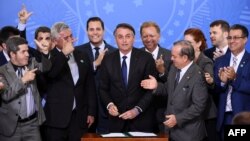Brazilians will no longer be permitted to carry assault weapons on the street after pro-gun President Jair Bolsonaro on Wednesday revised an order that enabled millions of civilians to be armed in public.
Eligible "common citizens" will be allowed to carry handguns but not rifles, the government said in a statement, admitting the change was in response to public outcry and legal and political challenges to the decree announced earlier this month.
Only rural landowners will be permitted to purchase such weapons, provided they are kept at home.
"There were criticisms that there might be some excesses [in the decree] and the government was sensitive to these criticisms," Justice Minister Sergio Moro said in an interview with Brazilian media on Wednesday.
"Normally the use of those weapons with the greatest potential for harm is restricted to the security forces," Moro added.
Assault weapon orders
The controversial decree still enables a wide range of professions, including truckers, politicians, hunters and even some journalists, to carry weapons without having to prove why they need them.
Brazilian arms maker Taurus said Monday it had received 2,000 orders for its T4 assault weapon that is designed for police and military use following the loosening of restrictions.
Its shares soared 7.6 percent Tuesday, but on Wednesday had given up more than half of those gains.
The Supreme Court is considering whether Bolsonaro's decree breaches the constitution after an opposition party challenged the order on the grounds it was "an abuse of power."
Opposition to decree
The decree also faces political hurdles.
An open letter signed by the governors of 14 states, including some with high rates of violence, that was published Wednesday criticized the decree for failing to improve security.
"On the contrary, it will increase the amount of arms and ammunition that can supply criminals and also the risk of arguments and fights between citizens ending in tragedy," they wrote.
Bolsonaro, a former army captain, has defended the order as honoring the result of a 2005 referendum in which nearly 64 percent of Brazilians rejected a law that included, among other things, a total ban on the sale of firearms.
But experts warn the loosening of restrictions will fuel gun violence in a country which already has one of the highest homicide rates in the world.
Brazil recorded 64,000 murders in 2017 — a rate of almost 31 per 100,000 inhabitants, or three times higher than the level the United Nations classifies as endemic violence.




